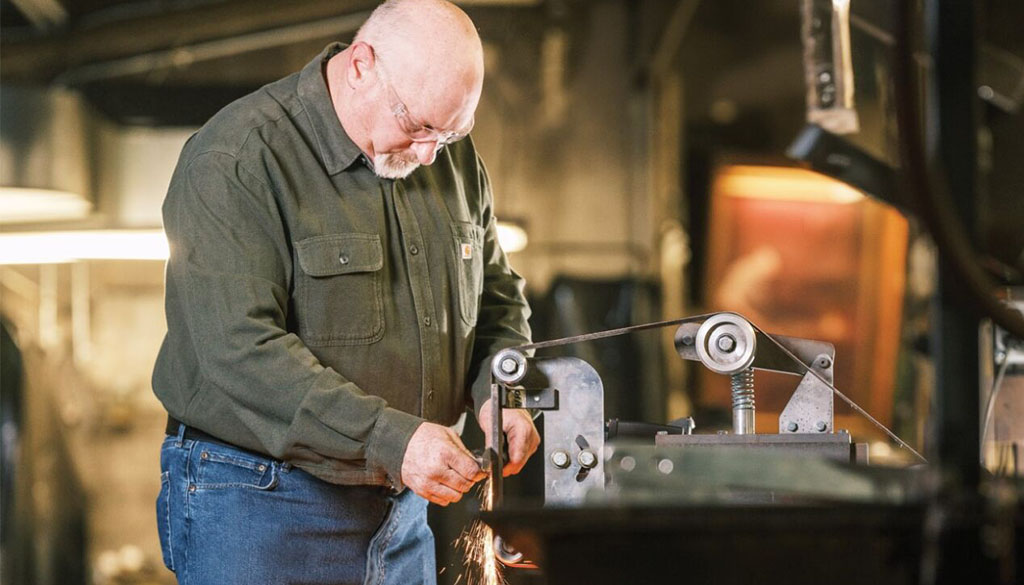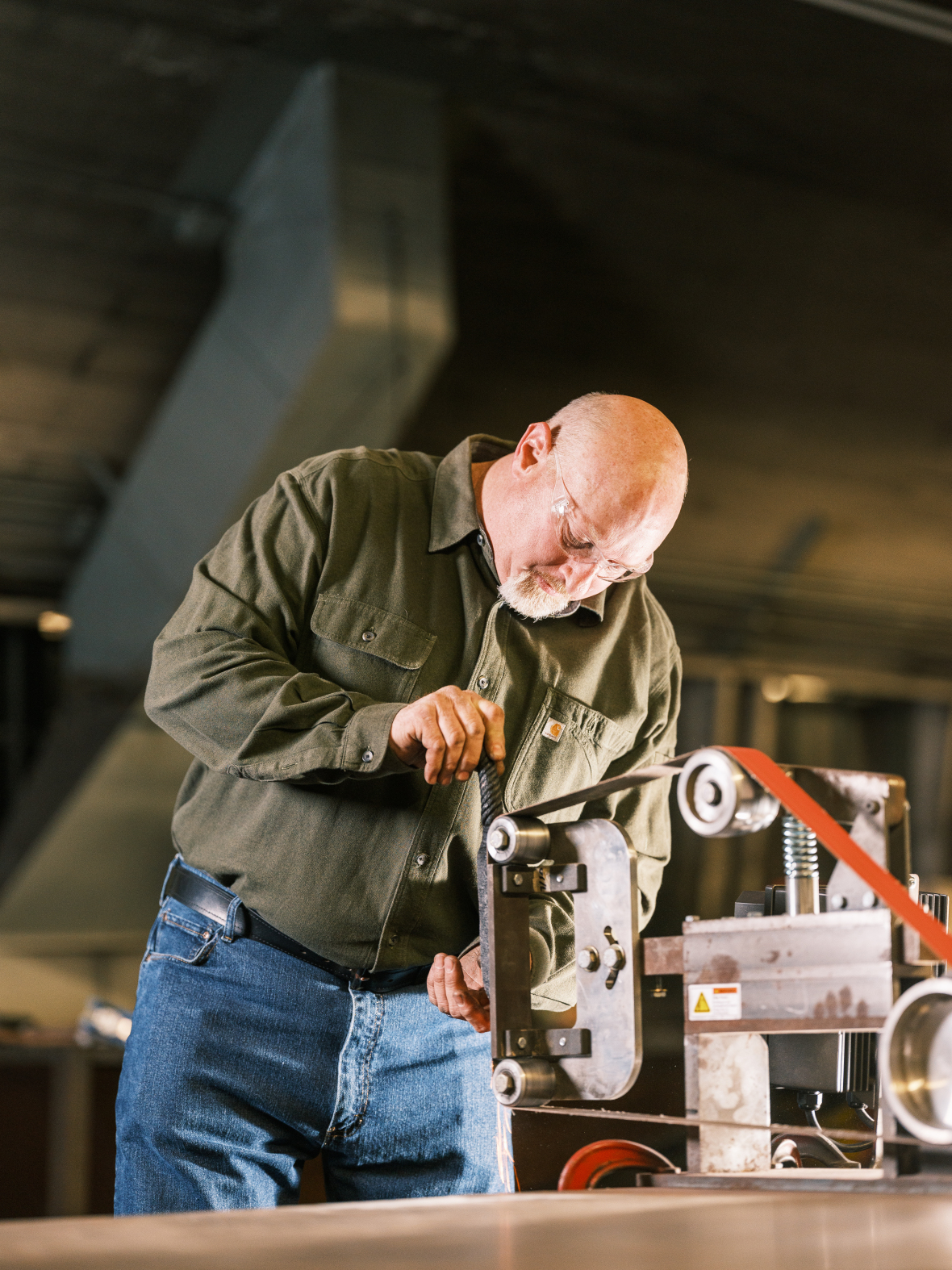05 Mar “I Want The Best for Everyone”: Jason’s Forged in Fire Experience
Winning Forged in Fire and Staying Humble

Jason Bivens never planned to compete on Forged in Fire, the History Channel’s immensely popular blacksmithing reality show, even though friends had been encouraging him for years. “Actually, I was tricked into it,” he joked, when asked what made him finally take the leap. Jason lives in McMinnville, Tennessee, and began blacksmithing in the early 1980s. “I was 12 years old with a big imagination,” he said, detailing how the film Conan the Barbarian inspired him to smith his first sword. “It was ugly but, to me, it was cool.” He’s kept diligently working at his craft, joining the Appalachia Area Chapter of Blacksmiths in the 1990s and, these days, teaching regularly at the Appalachian Center for Crafts in Smithville, TN. When the Folk School reached out about this exciting opportunity, Jason didn’t expect to end up on national television–or, spoiler alert, to win the whole season.

Normally filming in the Northeast, Forged in Fire went on the road for its tenth run, and picked the Folk School’s state-of-the-art Clay Spencer Blacksmith Shop as one of its four filming locations. We were thrilled to help with casting, enabling some of our instructors and Folk School’s friends to show off their skills on such a large and influential platform. Elizabeth Belz, our Blacksmithing and Metals Coordinator, was one of the show’s guest judges, giving viewers more information about the Folk School’s unique education model and the abundance of possibilities offered by our blacksmithing classes.
Our forge enjoyed the extra attention, but the Folk School is no stranger to the Forged in Fire world. We’re fortunate to have many previous contestants and winners teach classes yearly at the Folk School, including Brock Martin, Robert Burns, Mark J. Hopper, April Franklin, and others. And now, we can add Cole Aurichio, Jesse Bolding, and Jason Bivens to the list!
You’ll want to watch the entire season for all the action, but to quickly summarize: changing locations wasn’t the season’s only surprise. After a first-round Damascus challenge, advancing Jesse and Jason to the next round, the two had to make a pitchfork–requiring fabrication techniques not typically in a bladesmith’s wheelhouse. “I always like trying new things, making new things, and I enjoyed making that pitchfork,” Jason said. He ended up winning the round–making him the Folk School champion–and he headed up to Connecticut to compete against the other schools. In the next phase, he had to make a blade that could cut through tough bamboo and a full deck of cards. “Because I folded my steel, increasing the layer count, mine took a little bit of edge damage but sliced through all the cards.” That technique contributed to a higher finishing score and, as Jason says, “that saved me” as he went to the next round.
For the finale weapon, Jason had to forge a Moplah sword, a weapon with a wide and double-edged blade that’s broader near the tip and runs slightly concave. Jason used Damascus steel, a material notable for its patterned surface design, strength, and flexibility–perfect for a showstopping final weapon. “It was a lot tougher than I thought it was going to be,” Jason said, but he still came out on top.
Jason’s win was, in his words, “very unexpected,” and he’s staying humble through all the celebrations. “I’m not the type of person that likes to brag or rub it in people’s faces, especially because I got to be real good friends with Jess, Cole, and the other competitors. In the interviews, they were really trying to get me to say, ‘Yay! I’m the Forge in Fire Champion!’ but I didn’t feel comfortable doing that. I always want the best for everyone. For the other competitors, I hope that being on the show increases their blacksmithing business.”
On the surface, a show like Forged in Fire may seem to be in opposition to the Folk School’s noncompetitive model–but the show has more similarities than differences to the Folk School experience. “Part of the show,” Jason told us, “involves seeing how you overcome obstacles. They want to get you out of your comfort zone.” There’s a distinctive joy with trying something new, and it can lead to some incredible self-discovery–something we hear from students weekly here in Brasstown. The Folk School is enriching and enlivening because, after a class here, you oftentimes walk away accomplishing more than you ever expected–whether you finished a project or not. It’s why folks come here year after year with spouses, friends, family, and more.
Our blacksmithing classes run the gamut, teaching at beginner, intermediate, and advanced levels all year round. Beginners can try their hand at making hooks, fire pokers, or bottle openers, while advanced blacksmiths can tackle making axes, medieval armor, or full iron tables using traditional joinery techniques. Jason is coming back to the Folk School from May 12-17 to teach Damascus, covering some of the skills behind his prize-winning blade. (His class is the week after Forged in Fire judge, and multi-season winner, Benjamin Abbott.) “Where I live is similar landscape-wise to the John C. Campbell Folk School, and it’s so nice to visit there. In other words, when I come to the Folk School, I feel right at home.”
Check Out Our Other Blacksmithing Classes
Forged in Fire primarily promotes bladesmithing–the specific art of making edged tools like knives, daggers, and swords. Blacksmithing encompasses bladesmithing, but it’s a broader term used to include all forms of forging, says our Blacksmithing and Metals Coordinator Elizabeth Belz.
Watching hot, glowing metal take shape under the pounding force of your hammer is a powerful experience. The Folk School’s Blacksmithing program is one of the best in the country, with the foremost instructors teaching both weeklong and weekend classes for those at every skill level.
Look to the Past to Reinvent Your Future
The Folk School offers everyone the opportunity to try new crafts and cultivate skills. Many of our classes offer students ways to connect with the traditions of our past while embracing stewardship of the land and natural resources. Craft your own handmade life in 2024 by taking one of our classes highlighted below:



Sorry, the comment form is closed at this time.